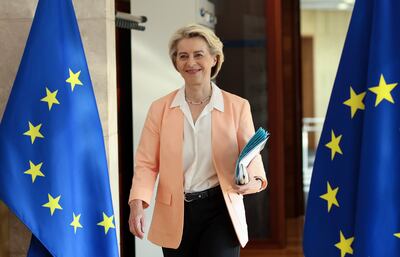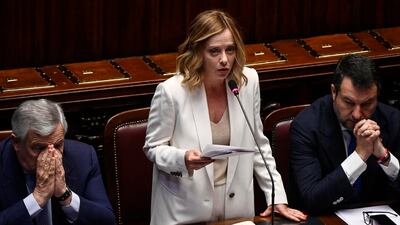Negotiations to nail down the next EU top jobs are set to start again on Thursday at a two-day summit of European leaders in Brussels, a week after they failed to clinch a deal.
Barring a last-minute surprise, consensus between the bloc's 27 leaders remains but Italian Prime Minister Giorgia Meloni has kept her counterparts on their toes as she publicly complained about her exclusion from negotiations despite an overwhelming victory at a recent European election.
Speaking ahead of the meeting, which is scheduled to be attended by Ukrainian President Volodymyr Zelenskyy, an EU official said that the aim was to have the “largest unity possible” on the top jobs, but refrained from commenting on whether they believed a deal would be struck.
Leaders will also discuss a new security package with Mr Zelenskyy, a diplomat said.
European Commission President Ursula von der Leyen and European Parliament boss Roberta Metsola are expected to keep their jobs for a second term. The job of president of the European Council is to go to former Portuguese prime minister Antonio Costa, a socialist, and the post of top diplomat to Estonian Prime Minister Kaja Kallas, a liberal.
The decision was widely believed to be validated at an informal dinner last week, but negotiators were taken by surprise by a request by the European People's Party, the centre-right group to which Ms von der Leyen and Ms Metsola belong.
The EPP asked to split the European Council president's five-year term in two, with Mr Costa serving two-and-a-half years and the other half given to an EPP figure. The request was rejected.
German Chancellor Olaf Scholz on Wednesday said he hoped negotiations would be swift.
“We cannot afford to drag our feet in these difficult times,” he said. The recent European Parliament vote had shown how multiple crises, from the coronavirus pandemic to Russia's invasion of Ukraine and the war in the Middle East, had shattered trust in the EU and national governments, he said.
Negotiations have been led by six leaders acting as chief negotiators from the alliance dominating the European Parliament: Greek Prime Minister Kyriakos Mitsotakis and Polish Prime Minister Donald Tusk for the EPP, Spanish Prime Minister Pedro Sanchez and Mr Scholz for the Socialists and Democrats, and French President Emmanuel Macron and Dutch Prime Minister Mark Rutte for centrist Renew.
Ms Meloni on Wednesday reiterated her dissatisfaction with the negotiations, saying that it was “surreal” she was excluded considering the electoral gains her hard-right European Conservatives and Reformists made in the recent election.

“In France, government forces elected only 16 per cent of the European parliamentarians due to that nation, in Germany 32 per cent and in Spain 34 per cent,” Ms Meloni told parliament.
“Only Italy among the great European nations has a positive figure, with almost 53 per cent of those elected” belonging to the governing coalition, she added.
Ms Meloni said she was “not surprised” that some leaders were attempting “clearly to maintain power even from positions of weakness”.
“The European ruling classes [are] tempted to sweep the dust under the carpet, as if nothing had happened,” she added.


